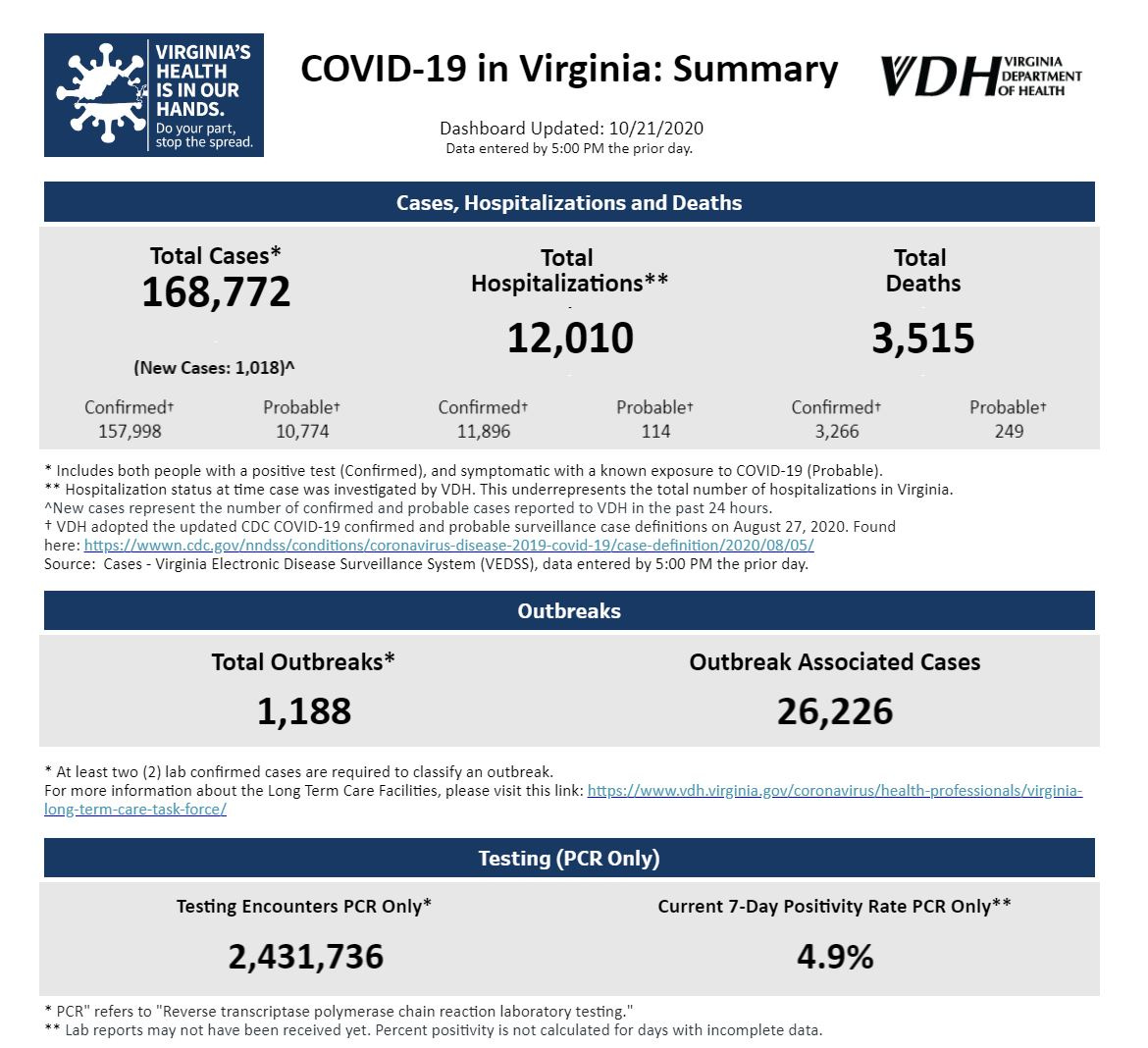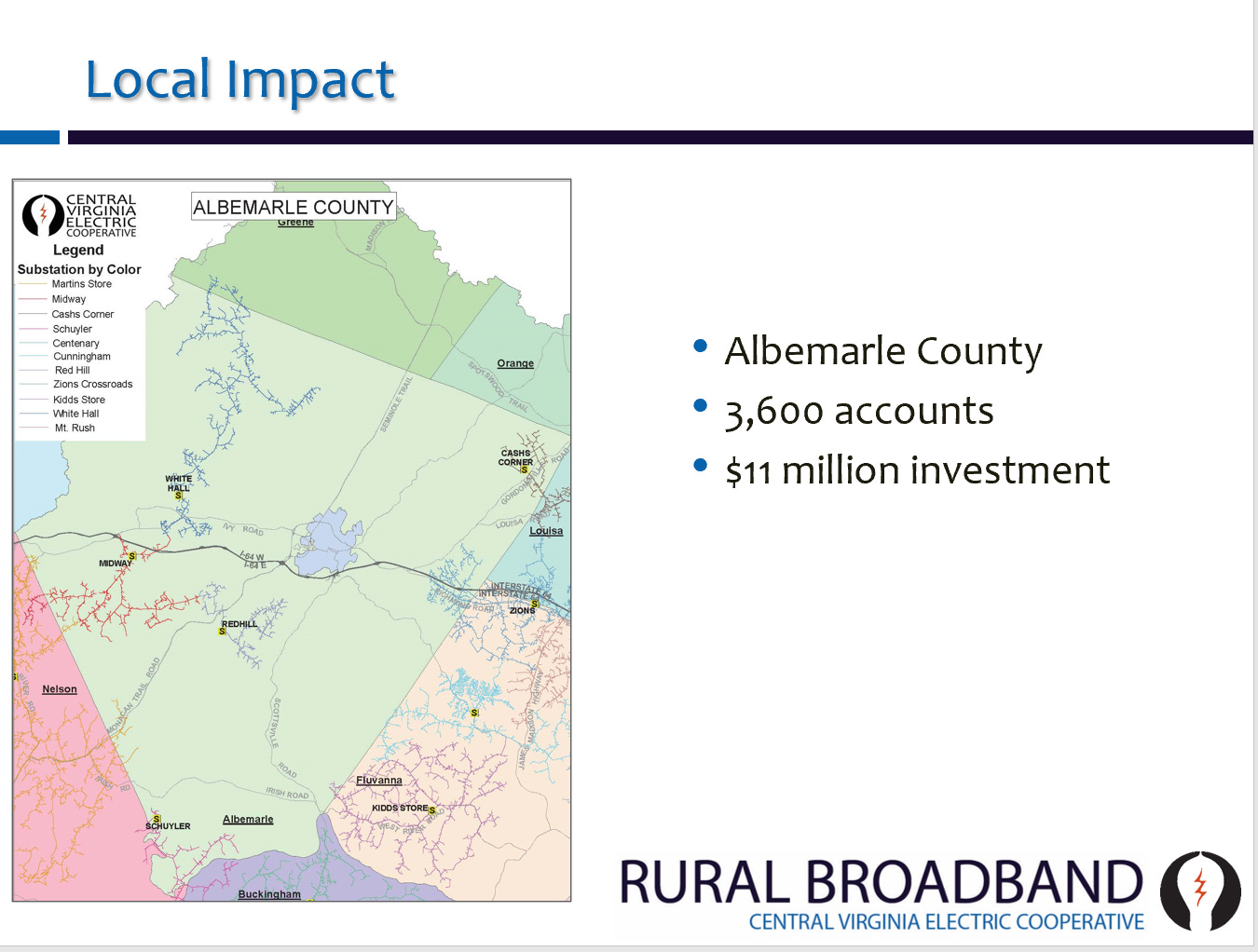Today’s Patreon-fueled shout-out comes from The Local Energy Alliance Program. LEAP wants you to consider a Home Energy Check-Up as the first step toward lowering your energy bills. For a $45 consultation, Albemarle and Charlottesville residents can have their homes audited to see what can be done to reduce energy consumption. Sign up today!”
*
The Virginia Department of Health has reported another 1,018 cases of COVID-19 today, bringing the seven-day average for new daily cases to 1,023. The seven-day average for positive tests is at 4.9 percent today, up from 4.6 percent last Wednesday. There were another 30 deaths reported, for a total of 3,515 since the first death was recorded on March 16.
In the Blue Ridge Health District, there are another 39 cases reported, bringing the seven-day average to 26 a day. Of today’s cases, there are 21 cases from Charlottesville, six from Albemarle, two from Greene, two from Louisa, two from Fluvanna and six from Nelson. That’s one of the biggest one-day increases for Nelson. The percent positivity for PCR tests for the entire district is at 2.4 percent today.
UVA now reports 59 active cases, 40 of whom are students. Five percent of quarantine rooms are occupied, as are four percent of isolation rooms.
UVA Today has an interview posted with Dr. William Petri about the global surge in COVID cases and what can be done. Dr. Petri is the vice chair for research in the Department of Medicine.
“I am leading the UVA part of a multi-center phase 3 study of a cocktail of anti-spike glycoprotein monoclonal antibodies for the prevention of household transmission of COVID-19,” he told writer Fariss Samarrai. “If this is shown to be successful, and if the cocktail can be mass-produced in adequate amounts, it would offer an additional approach to prevention before a vaccine becomes available.”

*
The Charlottesville Board of Architectural Review has passed a resolution that makes it easier for businesses in design control districts to expand operations outside. The motion states “the BAR unanimously expresses that outdoor tents and any supporting equipment or conditions including sides of tents, locating that does not conform to the current permits, access to electrical facilities, and other measures to support outdoor economic activity in the City, be permitted for as long as the Governor’s state of emergency is in effect.” The resolution came a day after Council temporarily reduced the cafe rental fees for outdoor eating spaces.
Susan Payne with the Downtown Business Association of Charlottesville welcomed the change.
“As the weather turns colder the new change in the city ordinance to allow tents on the Downtown Mall will allow restaurants to extend the time that they can remain open for outdoor dining,” Payne said. “By remaining open, restaurants will continue to add tax revenue to the City and keep staff employed.
*
The Albemarle Economic Development Authority got an update yesterday on the status of efforts to increase internet access in the rural area, an issue that has gained sudden prominence in a time of virtual education. Mike Culp is the information technology director for Albemarle County.
“The Albemarle Broadband Authority (ABBA) was formed in 2017 by the Board of Supervisors under the state’s wireless services authority act,” Culp said. “Under that act, that legislation does not allow the broadband authority to process payments or tax incentives.”
However, the broadband authority can enter into partnerships, and they’re doing so with the Central Virginia Electric Cooperative.
“They’re building fiber to their membership and we were fortunate to participate in a tax grant incentive agreement with them,” Culp said.

Gary Wood is the president of CVEC which serves 3,600 accounts in Albemarle.
“When we started the project, we were looking at a $110 million investment across parts of 14 counties over a five-year period,” Wood said. “Our original feasibility study indicated that our subsidiary, we’d have to create a subsidiary to provide internet service in Virginia because electric coops aren’t allowed to provide internet service by law.”
So CVEC created an entity called Firefly Fiber Broadband which leases fiber lines that the co-op is installing. Firefly Fiber Broadband then sells to households and businesses. However, the arrangement wouldn’t make financial sense without public investment.
“The original feasibility study indicated that our subsidiary would not reach break-even on an annual basis until the 7th year of operation and that it wouldn’t pay off those first seven years of losses and actually make the true dollar of profit until year 11,” Wood said.
CVEC has asked counties for investments in return for increased tax payments that CVEC will eventually pay on the revenues. They’ve also assembled funding from other state grants.
“Together with those various programs we have ended up with enough funding so that we will be in the black this year with Firefly which is really good news as this is our our second year of operation,” Wood said.
In Albemarle, CVEC is currently working in the southern and eastern ends of the county and is building $11 million worth of fiber. Wood said they are surpassing expectations in the feasibility study.
“What we’ve seen is, particularly in the Midway and Cash’s Corner area of Albemarle County, we’ve over 70 percent of the homes we’ve passed take service from us which is just an incredible take rate, well beyond our expectations,” Wood said.
That’s double what they had estimated. CVEC will continue to build out Firefly fiber along its electric lines but plans to expand by working with other utility companies.
*
The pandemic has changed commuting habits across the country, and those working to lower greenhouse gas emissions argue this time can help communities achieve reduction goals. The Community Climate Collaborative explored the topic at a Lunch and Learn as part of the Better Business Challenge.
Sara Pennington of the Thomas Jefferson Planning District Commission runs the RideShare program, which helps to reduce single occupancy vehicle usage.
“Rideshare is a local program that focuses on congestion mitigation and reducing greenhouse gases,” Pennington said. “One of the ways to do that is telework, and we are funded through the localities and the Virginia Department of Rail and Public Transportation.”
Pennington said one concept is flex scheduling where people build their work day around their own schedule. Statistics on telework were different before the pandemic.
“It’s interesting to know that pre-crisis or pre-pandemic, that eighty percent of workers surveyed through global workplace analytics showed an interest in teleworking, so even before COVID-19, people wanted to explore the potential to telework,” Pennington said.
Pennington said research from Global Workplace Analytics has demonstrated that employers in the United States have been able to save billions a day by shifting their workers over to teleworking.
“The pandemic, it was an emergency change where we all pivoted to figure out what we could do,” Pennington said. She added that working at home does present distractions as workers share space with family members. Pennington said she is hopeful more businesses will continue with teleworking even after the emergency is over. She said firms that offer teleworking could help with recruitment and retention, and offered tips on how to come up with policies.
Madeleine Ray is corporate sustainability manager for Apex Clean Energy and she said that technology helped power their transition.
“Something we have found that really helps with teleworking was Microsoft Teams, it’s been a great tool for communication within each team and then if you have a quick question for someone you can drop in on them with a chat or call,” Ray said.
Ray said the company was using the software before the pandemic, but not even close to the full capacity that Apex uses now.
The Better Business Challenge lunch and learn will be available soon on the Community Investment Collaborative’s YouTube channel.
*
Today in meetings, the Charlottesville Housing Advisory Committee meets at noon, and the Albemarle Board of Supervisors meets at one p.m. They’ll have a joint meeting with the county school board to begin preliminary discussions on the next budget.
They will also have a work session on proposed guidelines for anti-displacement and a tenant relocation policy. The Board adopted a general policy on September 18 but will now see more specific proposals. (agenda)
“The guidelines are designed to provide benefits for residential tenants who will be displaced by housing demolition, substantial rehabilitation, conversion to nonresidential use, or sale of a residential property under a sales contract that requires an empty building,” reads the staff report.
Supervisors will hold public hearings. They are for a special use permit for an a veterinary clinic, a new telecommunications lease at the county’s property on Buck’s Elbow Mountain, and to take public comment on changes to county code to remove gendered language.














Share this post